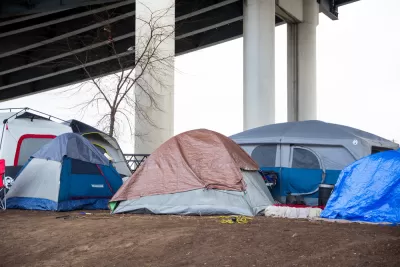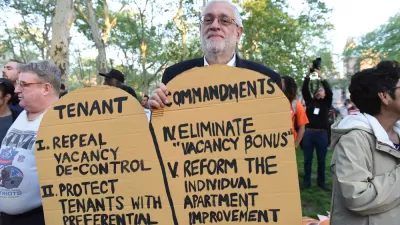Voters appear to have passed the most contentious ballot measure in San Francisco, Proposition Q, that allows city workers to remove tent encampments if shelter is available. Voters in other Bay Area counties passed taxes for affordable housing.

"San Francisco voters were venting their frustrations over homeless tent encampments in election returns Tuesday, while throughout the Bay Area a flurry of big-bucks ballot measures aimed at creating housing for homeless people was mostly on pace for approval," reports Kevin Fagan is a longtime reporter at the San Francisco Chronicle.
The hot-button homelessness issue on the San Francisco ballot was Proposition Q, which would let city workers remove tents from the street with 24 hours’ notice, provided that the transients in them were offered shelter or a ticket out of town to be reunited with family or friends.
However, there was no funding for housing in the measure. The sales tax increase, Proposition K, that would have funded new housing and transportation spending, was overwhelmingly rejected by voters, receiving less than 35 percent of the vote.
Prop. K would have boosted the city sales tax [by .75 percent] to 9.25 percent to generate the new money — including $100 million annually for transportation — and Prop. J establishes a special fund for spending homelessness allocations.
As of Thursday morning, Prop. Q was passing with 52.78 percent of the vote, but the result has yet to be certified despite 100 percent of precincts reporting due to mail-in ballots yet to be counted.
Fagan also reports on ballot measures in other Bay Area counties that provide funds for affordable housing that were approved by voters:
-
Measure A in Santa Clara County, which would direct $950 million in bond money toward supportive housing, needed to pass with a two-thirds majority, which it barely reached, with 67.35 percent voting 'yes'.
-
Alameda County’s $580 million Measure A1 bond also needed two-thirds approval. It passed with 72.32 percent of the vote.
-
San Mateo County’s $300 million Measure K half-cent sales tax extension, which required a simple majority, won with 70 percent.
Related in Planetizen:
- Election Roundup: Planning's Big Day at the Ballot Box, Nov. 9, 2016
- Voters to Decide Future of San Francisco Homeless Tent Encampments, June 23, 2016
FULL STORY: Voters opposing SF tents, backing housing for homeless

Planetizen Federal Action Tracker
A weekly monitor of how Trump’s orders and actions are impacting planners and planning in America.

Map: Where Senate Republicans Want to Sell Your Public Lands
For public land advocates, the Senate Republicans’ proposal to sell millions of acres of public land in the West is “the biggest fight of their careers.”

Restaurant Patios Were a Pandemic Win — Why Were They so Hard to Keep?
Social distancing requirements and changes in travel patterns prompted cities to pilot new uses for street and sidewalk space. Then it got complicated.

Platform Pilsner: Vancouver Transit Agency Releases... a Beer?
TransLink will receive a portion of every sale of the four-pack.

Toronto Weighs Cheaper Transit, Parking Hikes for Major Events
Special event rates would take effect during large festivals, sports games and concerts to ‘discourage driving, manage congestion and free up space for transit.”

Berlin to Consider Car-Free Zone Larger Than Manhattan
The area bound by the 22-mile Ringbahn would still allow 12 uses of a private automobile per year per person, and several other exemptions.
Urban Design for Planners 1: Software Tools
This six-course series explores essential urban design concepts using open source software and equips planners with the tools they need to participate fully in the urban design process.
Planning for Universal Design
Learn the tools for implementing Universal Design in planning regulations.
Heyer Gruel & Associates PA
JM Goldson LLC
Custer County Colorado
City of Camden Redevelopment Agency
City of Astoria
Transportation Research & Education Center (TREC) at Portland State University
Camden Redevelopment Agency
City of Claremont
Municipality of Princeton (NJ)





























